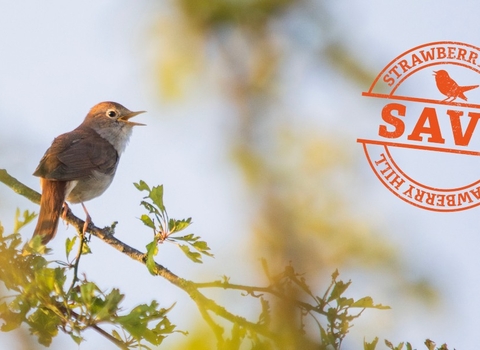What does a monk have to do with rewilding? Or, perhaps just as well, why should a life-long naturalist become a monk? But for the moment we’ll concentrate on why Strawberry Hill Farm suddenly became of great significance to this monk. My usual area of operations is in and around our monastery at Turvey, a few miles south of Knotting Green, and it’s all I can usually handle with a busy monastic schedule and a guesthouse to look after, but covid changed all that – no public services and no guests.
And so for the first time in many years I had time on my hands to explore further afield. I’d heard of the set-a-side at Knotting Green since its inception but never dared to cross the A6 and explore (strange folks north of the A6, more Viking than us this side of the Danelaw). I went in early April 2021 and was immediately taken with the sheer variety and sound of the many birds present as well as the interesting mix of scrub and grassland. I felt at home. Out came the notebook and the compulsive habit to record.
I had no map at this stage but made a rough one with a few of the more obvious landmarks and clocked some 23 species including eighteen singing chiffchaff, eleven willow warbler and four blackcap. Half-way round I met a neighbouring farmer and his wife and we very quickly got onto the theme of rewilding and the farmer expressed a desire to manage the place. I began to disagree and we parted but not before his wife had said, ‘By the way it’s wonderful for turtle doves and nightingale, and from our son’s farm over there on the hill looks just like a piece of African savannah’.
That was all I needed to keep coming back and turn an occasional visit into a proper mapping exercise, albeit in the style of the now defunct Common Bird Census. I’d done one of these in scrub on the South Downs in West Sussex some forty years before and was keen to see how the two might compare. Strawberry Hill beat the South Downs experience hollow – with final totals of over forty species of bird including a wonderful range of summer visitors obviously at home in this ‘savannah’ landscape: dozens of whitethroat, at least ten turtle dove and nine nightingale, several grasshopper warbler, lesser whitethroat and cuckoo and even a golden oriole on one occasion. This was Africa on our doorstep and it seemed just as good for our more resident species such as reed bunting, bullfinch, yellowhammer, song thrush and blackbird. Perhaps we all felt at home. This thought prompted by another conversation with another neighbouring farmer on one of the visits which went something like this:
Where have all the Swallows gone, we used to have four pairs in my barn, and that hasn’t changed?
Well, perhaps it’s the lack of insects.
There’s plenty of insects on my cattle.
When was the last time you had insects covering your windscreen?
Fair enough but it’s not the insecticides, we’re not allowed to use them like we used to. It’s the people netting them in Africa.
Well, that perhaps and deforestation in Africa, they’ve got nothing to go home for.
But this is their home, they nest here. Whose swallows are they?
Well, they spend six months there and six months here.
Umh.
What a good question - whose swallows are they?
It was a great conversation, we both enjoyed it and a lot more was said, but this led me to think how different our views can be depending on where we come from whether as farmers or conservationists, scientists or religious and how best to engage when one party is more obviously at home in this landscape than the other.
There’s a theory, I think, known as biophilia which is used to explain why humans feel more at home in a park-like or savannah landscape than any other – we originated from there. And can one dare say that this is true of all wilderness? And of God?






